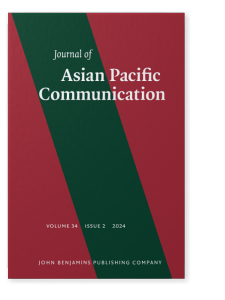Journal of Asian Pacific Communication
The Journal of Asian Pacific Communication (JAPC) is an international journal whose academic mission is to bring together specialists from diverse scholarly disciplines to discuss and interpret language in communication issues as they pertain to people of Asian Pacific regions and in their immigrant communities worldwide. The journal’s academic orientation is generalist, passionately committed to interdisciplinary approaches to language in communication studies relating to people in and from Asian Pacific regions.
Thematic issues of previously published issues of JAPC include Cross-Cultural Communications: Literature, Language, Ideas; Sociolinguistics in China; Japan Communication Issues; Mass Media in the Asian Pacific; Comic Art in Asia, Historical Literacy, and Political Roots; Communication Gains through Student Exchanges & Study Abroad; Language Issues in Malaysia; English Language Development in East Asia; The Teachings of Writing in the Pacific Basin; Language and Identity in Asia; The Economics of Language in the Asian Pacific; Culture, Contexts, and Communication in Multicultural Australia and New Zealand; Media Discourse in Greater China; Institutional Politeness in (South) East Asia.
JAPC publishes its articles Online First.
JAPC was previously published by Multilingual Matters (vols. 1-7) and Ablex (vols. 8-9).
Latest articles
12 November 2024
28 October 2024
4 October 2024
9 September 2024
8 July 2024
22 December 2023
21 December 2023
25 September 2023
28 August 2023
25 July 2023
20 June 2023
22 May 2023
30 March 2023
24 February 2023
20 February 2023
18 November 2022
15 November 2022
28 October 2022
8 August 2022
4 August 2022
19 July 2022
5 July 2022
31 May 2022
23 May 2022
19 April 2022
25 March 2022
22 March 2022
18 February 2022
15 February 2022
8 October 2021
16 August 2021
4 February 2021
22 January 2021
7 January 2021
29 October 2020
13 October 2020
9 October 2020
5 October 2020
17 September 2020
10 September 2020
8 September 2020
1 September 2020
30 June 2020
13 January 2020
19 December 2019
17 December 2019
6 August 2019
16 May 2019
10 August 2018
19 January 2018
20 November 2017
23 May 2017
11 May 2017
30 August 2016
16 June 2016
Issues
Online-first articlesVolume 34 (2024)
Volume 33 (2023)
Volume 32 (2022)
Volume 31 (2021)
Volume 30 (2020)
Volume 29 (2019)
Volume 28 (2018)
Volume 27 (2017)
Volume 26 (2016)
Volume 25 (2015)
Volume 24 (2014)
Volume 23 (2013)
Volume 22 (2012)
Volume 21 (2011)
Volume 20 (2010)
Volume 19 (2009)
Volume 18 (2008)
Volume 17 (2007)
Volume 16 (2006)
Volume 15 (2005)
Volume 14 (2004)
Volume 13 (2003)
Volume 12 (2002)
Volume 11 (2001)
Volume 10 (2000)
Board
Subscription Info
General information about our electronic journals.
Subscription rates
All prices for print + online include postage/handling.
| Online-only | Print + online | ||
|---|---|---|---|
| Volume 35 (2025): 2 issues; ca. 320 pp. | EUR |
EUR |
Individuals may apply for a special online-only subscription rate of EUR
Private subscriptions are for personal use only, and must be pre-paid and ordered directly from the publisher.
Available back-volumes
| Online-only | Print + online | ||
|---|---|---|---|
| Complete backset (Vols. 10‒34; 2000‒2024) |
50 issues; 8,000 pp. |
EUR 5,833.00 | EUR 6,343.00 |
| Volume 34 (2024) | 2 issues; 320 pp. | EUR |
EUR |
| Volume 33 (2023) | 2 issues; 320 pp. | EUR |
EUR |
| Volumes 30‒32 (2020‒2022) | 2 issues; avg. 320 pp. | EUR |
EUR |
| Volume 29 (2019) | 2 issues; 320 pp. | EUR |
EUR |
| Volume 28 (2018) | 2 issues; 320 pp. | EUR |
EUR |
| Volume 27 (2017) | 2 issues; 320 pp. | EUR |
EUR |
| Volume 26 (2016) | 2 issues; 320 pp. | EUR |
EUR |
| Volume 25 (2015) | 2 issues; 320 pp. | EUR |
EUR |
| Volume 24 (2014) | 2 issues; 320 pp. | EUR |
EUR |
| Volume 23 (2013) | 2 issues; 320 pp. | EUR |
EUR |
| Volumes 10‒22 (2000‒2012) | 2 issues; avg. 320 pp. | EUR |
EUR |
Submission
JAPC invites submissions in line with the aim and scope of the journal, which may be submitted to the editors at henning.kloeter
Before submitting, please consult these guidelines.
Ethics
John Benjamins journals are committed to maintaining the highest standards of publication ethics and to supporting ethical research practices.
Authors and reviewers are kindly requested to read this Ethics Statement .
Please also note the guidance on the use of (generative) AI in the statement.
Rights and Permissions
Authors must ensure that they have permission to use any third-party material in their contribution; the permission should include perpetual (not time-limited) world-wide distribution in print and electronic format.
For information on authors' rights, please consult the rights information page.
Open Access
Articles accepted for this journal can be made Open Access through payment of an Article Publication Charge (APC) of EUR 1800 (excl. tax). To arrange this, please contact openaccess
Corresponding authors from institutions with which John Benjamins has a Read & Publish arrangement can publish Open Access without paying a fee. Please consult this list of institutions for up-to-date information on which articles qualify.
For information about permission to post a version of your article online or in an institutional repository ('green' open access or self-archiving), please consult the rights information page.
If the article is not (to be made) Open Access, there is no fee for the author to publish in this journal.
Archiving
John Benjamins Publishing Company has an agreement in place with Portico for the archiving of all its online journals and e-books.
